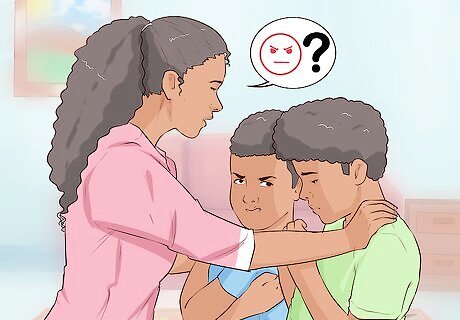
views
Examining the Issue

Determine if your loved ones are being reasonable. Certain fights actually have valid points. Some, however, seem completely irrational. Look at both sides from an unbiased perspective and ask yourself if it’s a fight that should actually be fought, or one that is ridiculous. Chances are if the argument doesn’t make sense, you’ll want to stay out of it. For instance, if your loved ones are having a small spat over whose turn it is to give their pet dog a bath, that's not really a serious enough argument to require your involvement.

Put yourself in their shoes. Pretend that you are in the argument and look at the situation from both sides. Would you respond the same way? Do you believe that one or both sides is completely just in being upset, or that one party is completely in the wrong? Taking the time to put yourself in their shoes may help you make your decision. For example, if one of your friends called the other a nasty name, consider whether the offense would upset you. If it would, you might choose to voice this opinion by saying "Well, Sarah, calling Jennifer a name kind of took things too far. Maybe you should just apologize."

Look at the evidence. Before you can determine your stance, you’ll need to take a close look at what the argument is really about. At this point, examine the fight from an outsider’s point of view. Try not to get bogged down by either side’s explanation yet. Don’t base your decision because of your feelings; you’ll need strong proof to make the right choice. Consider that one of your siblings is accusing the other of taking their new CD. If the other sibling sincerely doesn't seem to have the CD, and a cursory search through their room did not uncover it, there's a chance this could be a misunderstanding. Maybe you can simply use your energy to help your sibling look through their own room or other parts of the house for the CD. If you don’t have all the evidence yet, avoid taking sides so you don’t hurt anyone.
Talking to Both Sides

Ask questions about the argument. Before you know if you should take sides, you’ll need all of the facts. You may think you know each party’s version of the truth, but chances are, there are a few details that you are in the dark about, which could be quite important. Although both loved ones will likely spin the facts so that they’ll seem like the victim, it’s vital to know what both people think before making your choice. Wait until both people are calm, then ask them to explain what they are upset about. “So, what’s going on? Why are you fighting?” is a great way to mention the discussion. Asking these questions when they are upset will likely result in getting an answer that isn’t entirely the truth, as they will likely respond to you emotionally, rather than rationally.

Explain how the fighting affects you. Seeing two people you care about upset with each other is difficult. This is particularly the case when they are trying to drag you into it or it is impacting your relationship with both. The way they respond to you can impact your decision. For instance, tell each of the parties separately that you love them both, but their argument is impacting your life, as well. Let them know that it is preventing you from keeping your relationships with them in tact—if it is—and if they can suggest ways for you to cope. Say something like “I love you and I hate to see you guys not talking. Our sibling gatherings are all screwed up because of this fight, and it makes me sad.” If they are dismissive, you may want to stay out of it or choose the other side. If they are sincerely sorry, you may want to help their side. You might offer to be a non-biased mediator to help them work it out together.

Decide if offering advice is worth it. You may think you have the answers to their squabble, but you’ll need to determine if putting your two cents in is worth it. If both sides constantly seek your advice and you feel comfortable with that, then offering your opinion may be worth it. If their requests only hurt you, then you may want to stay out of it. If you’d rather not voice your opinion, tell your loved ones that you will continue to have relationships with each, as long as they keep you out of the middle. “I’m sorry, but I don’t want to get caught in the middle of this. You two will have to resolve this without me.” Be careful not to get dragged into their conflict.
Determining the Consequences

Ask yourself if taking sides would hurt your relationship. While some loved ones would understand if you side with the other, some may feel betrayed if you do. This feeling could hurt or even sever your relationship. Determine if you feel passionate enough about the argument that you are willing to take the risk, or if staying out of it would be more beneficial to your relationship. For example, if the fight is over something silly like one person lightly teasing the other, then you might let things play out on their own. However, if the fight involves one person’s voice not being heard or values not being respected, you might step in.

Determine if taking sides would resolve the argument. If your purpose of potentially taking sides is to end the fight, ask yourself if doing so actually would. Taking one side over the other may actually add fuel to the fire and result in the termination of a relationship. But if you believe that staying neutral would help the others resolve the tiff, then you may want to do that. Let's say your two best friends are arguing over who saw a girl first because they both want to ask her out. Nine times out of ten, taking a side will only make the other person mad at you. It wouldn't necessarily resolve the argument. In this case, it may be best to stay quiet.

Examine your role in the argument. Did you cause this fight to occur, either directly or indirectly? If your loved ones are fighting because they feel the other one wronged you, then it may be in your best interest to voice your opinion about how you feel so that the fight will, hopefully, end. If you caused the fight to occur by telling one what the other said about them, or some other similar situation, then perhaps you should attempt to play peacekeeper by apologizing to both sides and trying to help them work it out. For example, are your younger sisters arguing because they both want to help braid your hair? If so, they may just desperately want your attention because there is a severe lack of it. You may be able to resolve the situation by allowing one sister to take on one role and the other to do something equally special. Then, both sisters feel like they are getting your attention.


















Comments
0 comment